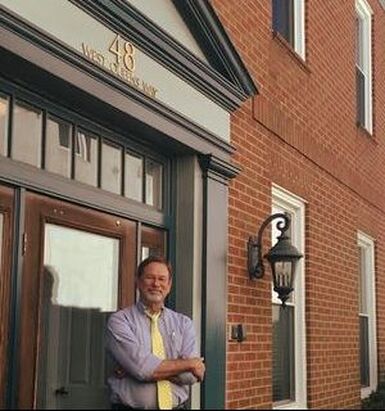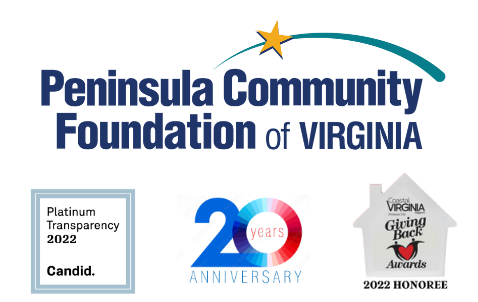Addressing disaster giving, eligible QCD recipients & tips for your business owner clients
|
Hello from the Peninsula Community Foundation!
Many thanks to those of you who have reached out over the last few weeks with questions you're hearing from your clients. We're happy to address three of the topics that appear to be top of mind. Specifically:
|
Thank you for all you do for our community! We appreciate the opportunity to work with you as you serve your clients. Together, we are making our community a better place for everyone.
Michael Monteith
CEO, Peninsula Community Foundation of Virginia
Michael Monteith
CEO, Peninsula Community Foundation of Virginia
Hidden no more: Designated funds and field-of-interest fundsMost attorneys, accountants, and financial advisors are well-aware of donor-advised funds and the reasons behind their popularity. Especially when a donor-advised fund is established at the Peninsula Community Foundation, this vehicle is an excellent way for your clients to organize their charitable giving and get even more connected to the causes they care about.
Enter the Qualified Charitable Distribution Your clients can give nearly any type of asset to a donor-advised fund at the community foundation. A notable exception, though, is the Qualified Charitable Distribution (QCD). A QCD allows a taxpayer 70 ½ or older to make a direct transfer of up to $100,000 annually from an IRA to a qualifying charity. A donor-advised fund is not considered to be a qualifying charity. |
Although donor-advised funds cannot accept QCDs, the Peninsula Community Foundation offers other types of funds that can accept QCDs. For example, designated funds and field-of-interest funds held at the community foundation are ideal recipients of QCD transfers. These fund types are often overlooked, despite the high value they can deliver to your client and to the community.
What is a field-of-interest fund?
The Council on Foundations defines a “field of interest fund” as, “A fund held by a community foundation that is used for a specific charitable purpose such as education or health research.” Perhaps your client is passionate about rare-disease solutions, feeding the food insecure or preserving works of art, for example. Your client selects the name of the fund (family, cause-related or even nondescript) and then, the knowledgeable team at the Peninsula Community Foundation distributes grants from the field-of-interest fund in a way that is aligned with your client’s values and charitable wishes outlined in the fund documentation.
What is a designated fund?
Designated funds are defined as, “A type of restricted fund in which the fund beneficiaries are specified by the grantors.” These are a good choice for a client who knows they want to support a particular charity or charities for multiple years. The client names the fund and the Peninsula Community Foundation fulfills the distributions. Made over time, these funds can help the charity’s or charities’ cash flow planning. Distributions are aligned with your client’s wishes set forth in the original fund document.
QCD reminders
For the client aged 70 ½ through 72, a QCD removes funds from an IRA before the client reaches the age-73 threshold for Required Minimum Distributions (RMDs). This can lessen the eventual income tax hit that accompanies RMDs. And for RMD-applicable clients, the QCD counts toward their RMD. In both cases, the QCD transfers do not fall into the client’s taxable income.
QCDs are even more popular now that the $100,000 cap will be indexed for inflation under the new laws. Also, under the new laws, a one-time, $50,000 distribution to a charitable remainder trust or charitable gift annuity is now permitted.
What is a field-of-interest fund?
The Council on Foundations defines a “field of interest fund” as, “A fund held by a community foundation that is used for a specific charitable purpose such as education or health research.” Perhaps your client is passionate about rare-disease solutions, feeding the food insecure or preserving works of art, for example. Your client selects the name of the fund (family, cause-related or even nondescript) and then, the knowledgeable team at the Peninsula Community Foundation distributes grants from the field-of-interest fund in a way that is aligned with your client’s values and charitable wishes outlined in the fund documentation.
What is a designated fund?
Designated funds are defined as, “A type of restricted fund in which the fund beneficiaries are specified by the grantors.” These are a good choice for a client who knows they want to support a particular charity or charities for multiple years. The client names the fund and the Peninsula Community Foundation fulfills the distributions. Made over time, these funds can help the charity’s or charities’ cash flow planning. Distributions are aligned with your client’s wishes set forth in the original fund document.
QCD reminders
For the client aged 70 ½ through 72, a QCD removes funds from an IRA before the client reaches the age-73 threshold for Required Minimum Distributions (RMDs). This can lessen the eventual income tax hit that accompanies RMDs. And for RMD-applicable clients, the QCD counts toward their RMD. In both cases, the QCD transfers do not fall into the client’s taxable income.
QCDs are even more popular now that the $100,000 cap will be indexed for inflation under the new laws. Also, under the new laws, a one-time, $50,000 distribution to a charitable remainder trust or charitable gift annuity is now permitted.
Giving a business to charity: Stack the odds in your client’s favorDespite recent reports of a 55% decline in charitable giving by the top 50 U.S. donors in 2022, high profile giving by donors associated with well-known businesses has maintained its place in the limelight, even amid recent market volatility and tenacious concerns about inflation and interest rates. Recent examples abound, including last year’s gift of Patagonia by founder Yvon Chouinard; the well-reported generosity of philanthropists Melinda French Gates and MacKenzie Scott; and the portion of the proceeds, potentially worth $5 billion, from the eventual sale of Subway restaurants that are set to flow to a charitable foundation. As an advisor to business owners—and collaborating with the Peninsula Community Foundation—you can help your clients leverage potential future liquidity events to support the community causes they care most about. |
Advance planning is critical. The community foundation team is happy to get involved as early as possible in your discussions with a client about giving part (or all) of a closely-held business to charitable causes. These transactions carry with them layers of complexity, largely around the timing of the charitable gifts in relation to the sale transaction. The best outcomes are achieved through a thoughtful, multi-step process.
Many successful closely-held exit transactions occur only after several years of planning—and most of that planning occurs well before potential buyers are even engaged. This planning period is an important time for your client to consider giving ownership shares of the company to a donor-advised fund at the Peninsula Community Foundation, especially knowing that under certain circumstances, the proceeds of the shares held by the donor-advised fund will be immune from capital gains taxes if the business eventually does sell, leaving more money to support the client’s favorite causes.
You might even consider encouraging your client to give shares to a donor-advised fund not all at once, but in increments over time during the business exit planning period (before a buyer is identified). This can help avoid the appearance that the gift is merely a function of the business sale and as such intended to be a tax dodge. If the IRS determines that the stock gifts to charity and the sale of the company are really one and the same event–a “step transaction” --the tax benefits of the charitable deduction could be disallowed.
Another essential part of the process is to secure a proper valuation of the stock by an independent and qualified appraiser for charitable deduction purposes when the ownership is gifted to the donor-advised fund at the community foundation.
Please reach out to our team to discuss how we can help your business owner clients who intend to maximize their future ability to support the charities they love.
Many successful closely-held exit transactions occur only after several years of planning—and most of that planning occurs well before potential buyers are even engaged. This planning period is an important time for your client to consider giving ownership shares of the company to a donor-advised fund at the Peninsula Community Foundation, especially knowing that under certain circumstances, the proceeds of the shares held by the donor-advised fund will be immune from capital gains taxes if the business eventually does sell, leaving more money to support the client’s favorite causes.
You might even consider encouraging your client to give shares to a donor-advised fund not all at once, but in increments over time during the business exit planning period (before a buyer is identified). This can help avoid the appearance that the gift is merely a function of the business sale and as such intended to be a tax dodge. If the IRS determines that the stock gifts to charity and the sale of the company are really one and the same event–a “step transaction” --the tax benefits of the charitable deduction could be disallowed.
Another essential part of the process is to secure a proper valuation of the stock by an independent and qualified appraiser for charitable deduction purposes when the ownership is gifted to the donor-advised fund at the community foundation.
Please reach out to our team to discuss how we can help your business owner clients who intend to maximize their future ability to support the charities they love.
Disaster giving: Perspectives for your clientsBoth the recent one-year anniversary of the start of the Ukraine conflict and the earthquake that has devastated Turkey and Syria are causing more and more people to explore ways they can help. In an era of abundant giving methods and (sadly) potential fraud, the community foundation is a source of reliability and expediency to help your clients act on their charitable instincts.
There are many viable options for your clients to activate their generosity toward relief efforts, but there are also caveats. While global disaster giving is important, it is also important for clients to stay tuned to the most critical needs right here in our community. Although these critical needs do not always take the form of a time-bound disaster, the impact of ongoing crises such as low access to health care and poverty can be quite damaging over the long term. |
Annual giving to international affairs declined approximately 5% from 2019 to 2021, finishing at $27.4 billion. Of course, these figures will change for 2022 when accounting for aid to Ukraine (and in future reports, to Turkey and Syria). As context, through February 2023, U.S. government aid to Ukraine has exceeded $75 billion, including 40% for humanitarian and financial purposes and the remainder for the military. Philanthropy also contributed to humanitarian needs; the 10 largest private donations, led by Microsoft, totaled more than $1.2 billion.
How the Peninsula Community Foundation can help.
The community foundation can help your clients fulfill their giving instincts by acting as a secure, knowledgeable, and trustworthy facilitator. Our team personally knows–and regularly vets–hundreds of charities every year, and we can help you and your clients navigate the options for both local and international giving.
Frequently, a donor-advised fund at the community foundation will be a suitable giving vehicle for your clients. Our team can help connect your clients to the causes they care about by identifying the most effective organizations addressing the critical needs both locally and globally in your clients’ areas of interest. Working with the community foundation also helps your clients secure robust tax planning benefits that can be missed when a client gives to charity on an impulse.
Finally, the community foundation can help your clients steer clear of scams perpetrated via familiar-looking but sham websites and QR codes, both of which proliferate during highly emotional or threatening times surrounding a disaster. While your clients may be tempted to make a gift online or by phone out of compassion in response to a verbal solicitation or a news story, remind them that the community foundation has much to offer—safely, securely and advantageously—when it’s time to make impactful humanitarian gifts both here and abroad.
How the Peninsula Community Foundation can help.
The community foundation can help your clients fulfill their giving instincts by acting as a secure, knowledgeable, and trustworthy facilitator. Our team personally knows–and regularly vets–hundreds of charities every year, and we can help you and your clients navigate the options for both local and international giving.
Frequently, a donor-advised fund at the community foundation will be a suitable giving vehicle for your clients. Our team can help connect your clients to the causes they care about by identifying the most effective organizations addressing the critical needs both locally and globally in your clients’ areas of interest. Working with the community foundation also helps your clients secure robust tax planning benefits that can be missed when a client gives to charity on an impulse.
Finally, the community foundation can help your clients steer clear of scams perpetrated via familiar-looking but sham websites and QR codes, both of which proliferate during highly emotional or threatening times surrounding a disaster. While your clients may be tempted to make a gift online or by phone out of compassion in response to a verbal solicitation or a news story, remind them that the community foundation has much to offer—safely, securely and advantageously—when it’s time to make impactful humanitarian gifts both here and abroad.
The team at the community foundation is a resource and sounding board as you serve your philanthropic clients. We understand the charitable side of the equation and are happy to serve as a secondary source as you manage the primary relationship with your clients. This newsletter is provided for informational purposes only. It is not intended as legal, accounting, or financial planning advice.





